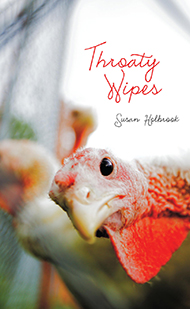Reviews
Poetry Review by Jessica Michalofsky
Susan Holbrook, Throaty Wipes (Toronto: Coach House, 2016). Paperbound, 80 pp., $18.95.
 Like the writing of Gertrude Stein, Susan Holbrook’s poetry displays a fascination with the intrinsic intelligibility of language. Words mean even when we don’t intend them to mean. Her third book of poetry, Throaty Wipes, takes a playful swipe at what poetry is—and isn’t—and comes up with the same answer.
Like the writing of Gertrude Stein, Susan Holbrook’s poetry displays a fascination with the intrinsic intelligibility of language. Words mean even when we don’t intend them to mean. Her third book of poetry, Throaty Wipes, takes a playful swipe at what poetry is—and isn’t—and comes up with the same answer.
In the first poem of the collection, “What is Poetry,” anagrams of the titular question form possible answers.
poetry is what
whips yo tater
pets it awry, oh
oh, twisty pear
two hearts yip
it’s paw theory
This is a clever concept that produces an odd result and suggests that inside every utterance is a mirrored utterance, which offers multiple possibilities, sometimes ludicrous, sometimes plausible, to the question what is poetry?—in the case of the poem—but in a larger sense, to any statement.
A few pages later, “My Fellow Contranym” shows how words not only contain multiple meanings, but also their opposites. The premise of the poem is a conversation between (at least) two speakers. A comic situation arises when the speakers use the same words to mean different things. Cleave, for example, can mean to adhere and to divide, and ravel can mean totangle or to untangle. (A whole other, new level of difference is revealed when one contemplates the possibilities that unravel presents). Let us think about that for a moment: if the language used in poetry creates voids or opposite meanings that can dispute the meaning we intend, then perhaps the better question is what is poetry not? It’s as if we have been looking at the positive white image of the vase our whole lives when suddenly we see the black negative images of the man in profile suddenly appear.
Many of the poems in Throaty Wipes have a triumphantly anti-poetry feeling to them. That is, they celebrate the not-ness, the missing, the evocable. A three-part poem called “Disposable Thumbs” lists the various parts of the body that can be excised without causing harm to the human operator (the tonsils, the appendix, and the placenta). Holbrook presents us with the idea that there are things hidden from us within the body poetic, and that their loss or removal can be not only harmless but also instructive. “You Didn’t Miss Much,” satirizes W. C. Williams’ famous pinched plums to laugh-out-loud effect. Erasures to that text produce a second, hidden conversation, a possible response to the plum-gobbler’s smug pillage of the icebox from a nonplussed lover: for me they were so-so. In fact, most of the poems in Throaty Wipes display a certain gleeful metafictionality. “Gest” engages the various etymologies of the title (a tale of exploits or notable deeds; the act of carrying, gestation; a joke) in a dialogue that questions how we read. “Gest” introduces, flowing out from the left-hand margin, the lineage of Adam from the Bible—seventy or so lines of begats—fathers inexplicably and apparently without sexual reproduction begetting their own sons, who, in turn, beget their own sons. In response, flowing out from the right-hand margin, a mother’s monologue to her child about birth. The result is a confrontation between the epic and the lyric. At first, I noticed that I could only read one side at a time, but as I progressed through the poem I found I could read across the page.
At times, the effect is comic. The fruits of Mahalaleel’s loins and his superhuman feat of living eight hundred ninety and five years march up against the commonplace scene of a cat giving birth under a porch. Other times, the effect is more grave: Methuselah’s boast of three hundred years of begetting is placed plainly beside the half a million women who die in childbirth a year—in Sub-Saharan Africa—“one every minute.” The complete history of our origin can be told, the poem argues, by contesting the singularity and authority of voice—and this can be achieved by noticing and challenging how we read texts.
“Layman’s Terms” takes on metaphor. By its very nature, metaphor argues that thisis that—the yoking of the true and the untrue via a copulative verb. But the very nature of language is representation, and so, all words become metaphors of what they might represent and, therefore, are in essence untrue. This, for Holbrook, is a kind of fascinating problem.
Okay, say the tower
is bathwater, the dish
is your drainpipe, your
computer a septic tank,
the trees a cracked
waste shoe.
But problems in Holbrook’s universe tend to have positive meanings. The collection finishes, aptly, with a poem titled “What Poetry Isn’t,” wherein more proposals are put forward in the form of anagrams of the question. Once again, we are reminded that the answer to a question—how to distinguish poetry, say, from prose, or even from just random words—may lie within the very language from which the question is formed. This has the effect of transforming such questions from banal arguments about form or genre to high-spirited, multi-faceted koans in which language is infinitely poetic.
—Jessica Michalofsky









